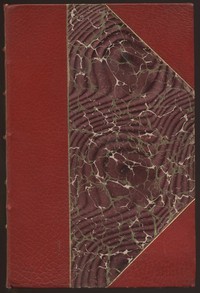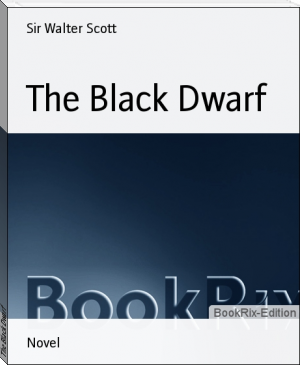Old Mortality, Volume 2. by Walter Scott (most important books to read txt) 📗

- Author: Walter Scott
Book online «Old Mortality, Volume 2. by Walter Scott (most important books to read txt) 📗». Author Walter Scott
"Like eneugh, my leddy, for he's a' in rags, poor creature."
Gudyill made another attempt to get at Gibbie's commission, which was indeed of the last importance, being a few lines from Morton to Lord Evandale, acquainting him with the danger in which he stood from the practices of Olifant, and exhorting him either to instant flight, or else to come to Glasgow and surrender himself, where he could assure him of protection. This billet, hastily written, he intrusted to Gibbie, whom he saw feeding his herd beside the bridge, and backed with a couple of dollars his desire that it might instantly be delivered into the hand to which it was addressed.
But it was decreed that Goose-Gibbie's intermediation, whether as an emissary or as a man-at-arms, should be unfortunate to the family of Tillietudlem. He unluckily tarried so long at the ale-house to prove if his employer's coin was good that, when he appeared at Fairy Knowe, the little sense which nature had given him was effectually drowned in ale and brandy; and instead of asking for Lord Evandale, he demanded to speak with Lady Margaret, whose name was more familiar to his ear. Being refused admittance to her presence, he staggered away with the letter undelivered, perversely faithful to Morton's instructions in the only point in which it would have been well had he departed from them. A few minutes after he was gone, Edith entered the apartment. Lord Evandale and she met with mutual embarrassment, which Lady Margaret, who only knew in general that their union had been postponed by her granddaughter's indisposition, set down to the bashfulness of a bride and bridegroom, and, to place them at ease, began to talk to Lady Emily on indifferent topics. At this moment Edith, with a countenance as pale as death, muttered, rather than whispered, to Lord Evandale a request to speak with him. He offered his arm, and supported her into the small ante-room, which, as we have noticed before, opened from the parlour. He placed her in a chair, and, taking one himself, awaited the opening of the conversation.
"I am distressed, my lord," were the first words she was able to articulate, and those with difficulty; "I scarce know what I would say, nor how to speak it."
"If I have any share in occasioning your uneasiness," said Lord Evandale, mildly, "you will soon, Edith, be released from it."
"You are determined then, my lord," she replied, "to run this desperate course with desperate men, in spite of your own better reason, in spite of your friends' entreaties, in spite of the almost inevitable ruin which yawns before you?"
"Forgive me, Miss Bellenden; even your solicitude on my account must not detain me when my honour calls. My horses stand ready saddled, my servants are prepared, the signal for rising will be given so soon as I reach Kilsyth. If it is my fate that calls me, I will not shun meeting it. It will be something," he said, taking her hand, "to die deserving your compassion, since I cannot gain your love."
"Oh, my lord, remain!" said Edith, in a tone which went to his heart; "time may explain the strange circumstance which has shocked me so much; my agitated nerves may recover their tranquillity. Oh, do not rush on death and ruin! remain to be our prop and stay, and hope everything from time!"
"It is too late, Edith," answered Lord Evandale; "and I were most ungenerous could I practise on the warmth and kindliness of your feelings towards me. I know you cannot love me; nervous distress, so strong as to conjure up the appearance of the dead or absent, indicates a predilection too powerful to give way to friendship and gratitude alone. But were it otherwise, the die is now cast."
As he spoke thus, Cuddie burst into the room, terror and haste in his countenance. "Oh, my lord, hide yoursell! they hae beset the outlets o' the house," was his first exclamation.
"They? Who?" said Lord Evandale.
"A party of horse, headed by Basil Olifant," answered Cuddie.
"Oh, hide yourself, my lord!" echoed Edith, in an agony of terror.
"I will not, by Heaven!" answered Lord Evandale. "What right has the villain to assail me or stop my passage? I will make my way, were he backed by a regiment; tell Halliday and Hunter to get out the horses.— And now, farewell, Edith!" He clasped her in his arms, and kissed her tenderly; then, bursting from his sister, who, with Lady Margaret, endeavoured to detain him, rushed out and mounted his horse.
All was in confusion; the women shrieked and hurried in consternation to the front windows of the house, from which they could see a small party of horsemen, of whom two only seemed soldiers. They were on the open ground before Cuddie's cottage, at the bottom of the descent from the house, and showed caution in approaching it, as if uncertain of the strength within.
"He may escape, he may escape!" said Edith; "oh, would he but take the by-road!"
But Lord Evandale, determined to face a danger which his high spirit undervalued, commanded his servants to follow him, and rode composedly down the avenue. Old Gudyill ran to arm himself, and Cuddie snatched down a gun which was kept for the protection of the house, and, although on foot, followed Lord Evandale. It was in vain his wife, who had hurried up on the alarm, hung by his skirts, threatening him with death by the sword or halter for meddling with other folk's matters.
"Hand your peace, ye b——," said Cuddie; "and that's braid Scotch, or I wotna what is. Is it ither folk's matters to see Lord Evandale murdered before my face?" and down the avenue he marched. But considering on the way that he composed the whole infantry, as John Gudyill had not appeared, he took his vantage ground behind the hedge, hammered his flint, cocked his piece, and, taking a long aim at Laird Basil, as he was called, stood prompt for action.
As soon as Lord Evandale appeared, Olifant's party spread themselves a little, as if preparing to enclose him. Their leader stood fast, supported by three men, two of whom were dragoons, the third in dress and appearance a countryman, all well armed. But the strong figure, stern features, and resolved manner of the third attendant made him seem the most formidable of the party; and whoever had before seen him could have no difficulty in recognising Balfour of Burley.
"Follow me," said Lord Evandale to his servants, "and if we are forcibly opposed, do as I do." He advanced at a hand gallop towards Olifant, and was in the act of demanding why he had thus beset the road, when Olifant called out, "Shoot the traitor!" and the whole four fired their carabines upon the unfortunate nobleman. He reeled in the, saddle, advanced his hand to the holster, and drew a pistol, but, unable to discharge it, fell from his horse mortally wounded. His servants had presented their carabines. Hunter fired at random; but Halliday, who was an intrepid fellow, took aim at Inglis, and shot him dead on the spot. At the same instant a shot from behind the hedge still more effectually avenged Lord Evandale, for the ball took place in the very midst of Basil Olifant's forehead, and stretched him lifeless on the ground. His followers, astonished at the execution done in so short a time, seemed rather disposed to stand inactive, when Burley, whose blood was up with the contest, exclaimed, "Down with the Midianites!" and attacked Halliday sword in hand. At this instant the clatter of horses' hoofs was heard, and a party of horse, rapidly advancing on the road from Glasgow, appeared on the fatal field. They were foreign dragoons, led by the Dutch commandant Wittenbold, accompanied by Morton and a civil magistrate.
A hasty call to surrender, in the name of God and King William, was obeyed by all except Burley, who turned his horse and attempted to escape. Several soldiers pursued him by command of their officer, but, being well mounted, only the two headmost seemed likely to gain on him. He turned deliberately twice, and discharging first one of his pistols, and then the other, rid himself of the one pursuer by mortally wounding him, and of the other by shooting his horse, and then continued his flight to Bothwell Bridge, where, for his misfortune, he found the gates shut and guarded. Turning from thence, he made for a place where the river seemed passable, and plunged into the stream, the bullets from the pistols and carabines of his pursuers whizzing around him. Two balls took effect when he was past the middle of the stream, and he felt himself dangerously wounded. He reined his horse round in the midst of the river, and returned towards the bank he had left, waving his hand, as if with the purpose of intimating that he surrendered. The troopers ceased firing at him accordingly, and awaited his return, two of them riding a little way into the river to seize and disarm him. But it presently appeared that his purpose was revenge, not safety. As he approached the two





Comments (0)